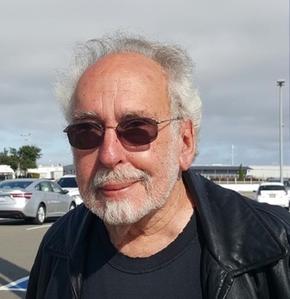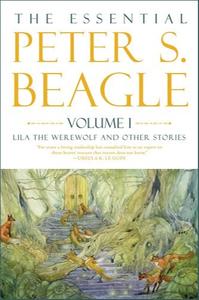
|
|
| photo: Kathleen Hunt | |
Author and screenwriter Peter S. Beagle has won nearly every award available to science fiction and fantasy writers, including the Hugo, Nebula, Locus, Mythopoeic, and World Fantasy Awards, as well as the SFWA Grand Master Award. For more than 60 years, he has given generations of readers the magic of unicorns, haunted cemeteries, lascivious trees, and disgruntled gods. His best-known work is The Last Unicorn. Beagle is also known for his work on screen, including the teleplay for "Sarek," one of the most popular episodes of the TV series Star Trek: The Next Generation. Tachyon Publications recently released a two-volume set of his stories: The Essential Peter S. Beagle.
Handsell readers your book in 25 words or less:
I've always told stories; it's what I do. These books give you a look at a few of the different worlds inside my head.
On your nightstand now:
I am currently reading Take Two: A Life in Movies and Politics by Philip Dunne, which is a marvelous book. I actually met Philip Dunne and became friends with him. He was amazed that I knew his father's work (Finley Peter Dunne, author of the Mr. Dooley essays in my father's time). Phil told me that he had all kinds of education, but he couldn't actually do anything, so there was nothing for him to do but go to Hollywood to look for work. His father had friends there, so he got jobs and worked with some remarkable people who taught him how to do screenwriting. When I met him, he was retired. He was a genuinely civilized man who also happened to be a liberal at a time when that could be dangerous.
Before that, I was reading Flash for Freedom! by George MacDonald Fraser, which is the second in his Flashman series. I read everything by George MacDonald Fraser that I can get my hands on. They're very good stories; they have a very appealing hero.
Favorite book when you were a child:
You honestly expect me to remember that far back? I read everything by A.A. Milne, more than a few times. Winnie-the-Pooh does the right thing, even when he knows he doesn't want to do it. Winnie-the-Pooh has a sense of honor. As a child, I didn't always want to do the right thing either, but I knew what it was. Winnie-the-Pooh is a poet, too, and his best friend, Piglet, is much more practical than he is, so I could relate.
Your top five authors:
Ursula K. Le Guin: Ursula could do everything, and she always made it look easy even when I knew it wasn't.
James Thurber: James Thurber simply marked my life even when I didn't realize it. There are two books in particular: The 13 Clocks and The White Deer. Those two books made a difference in the way that I write.
Michael Gruber: Michael Gruber has no business being as good as he is, and he knows stuff he shouldn't know. He's one writer I'd really like to meet so that I could ask him: "How do you think like that?"
Avram Davidson: Avram didn't know everything in the world. I know that, and we even discussed that. For all practical purposes, though, I believe in my heart that he really did know everything in the world.
Diana Norman: Diana was funny, scary, and I believe every one of her characters completely. I can't say that about many people. We always meant to meet in person, but we never did, and it still pisses me off.
Book you've faked reading:
I keep trying to read Dan Brown's novels, but I never quite do. I'm sure it's my own fault.
 Book you're an evangelist for:
Book you're an evangelist for:
The Time Traveler's Guide to Medieval England by Ian Mortimer. If you're going to write a historical novel, you've got to start with that one. It's a fascinating book about the way that medieval England actually was, as opposed to the novels about it. It's still a book that I go back to if I'm setting a story in anything like medieval England.
Book you've bought for the cover:
I've never bought books by their cover. Half the time, I don't even notice the cover. I do love the covers of these new books, though. They're nothing that I would have imagined or thought of, but they work so perfectly. Somehow, they suggest everything.
Book you hid from your parents:
I never hid anything from my parents. I was allowed to read everything. I've always appreciated their encouragement in that aspect.
Book that changed your life:
Writing The Last Unicorn. I didn't know that at the time; it's just the way it worked out. Over the years, people have written to me from all over the world. They ask questions about it or tell me how much different characters meant to them, but that's not what I expected at all when I was writing it. I've made friends with so many people because of that book!
Favorite line from a book:
James Thurber said: "It is better to know some of the questions than all of the answers." I like that because it gives you space to be wrong.
Five books you'll never part with:
The answer changes almost daily. Today, this is the list:
The Golem and the Jinni by Helene Wecker. I've talked before about how much I love that book. She's just too young to have written it!
Wolf Man's Maker by Curt Siodmak. It talks about so many things, and it incorporates so much of his life. He made a real distinction between what he wrote for money and what he wrote for love, and that's so interesting to me.
Adventures in Unhistory by Avram Davidson. His mind wanders and you never know where he's going to go.
When Shlemiel Went to Warsaw by Isaac Bashevis Singer. The stories always surprise me. They never come out the way I thought they would, even when I know them.
The Wind in the Willows by Kenneth Grahame. It brings back so much of my childhood, and my mother who read it to me.
Book you most want to read again for the first time:
Surely You're Joking, Mr. Feynman! by Richard Feynman. The love of my life loved his work, and I was always under instructions to read anything of his I could find.

